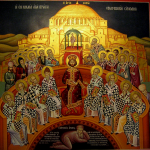Today is the feast of the birth of Mary. Something I remember from my Catholic school days is something called The Imitation of Mary. It’s an actual book by Thomas A. Kempis, but the idea of imitating Mary is honestly intimidating. She was born without sin and she has so many miracles attributed to her. How the heck are we ordinary, flawed, imperfect humans supposed to be anything like her?
It starts by remembering that aside from being born without sin, Mary was just as human as the rest of us. She felt pain, she felt fear, she felt loss just like the rest of us. She was a mother and a wife and a daughter and a cousin. I imagine her as a short and sassy woman who wasn’t picture-perfect in looks, but still beautiful in heart. Once we remember that Mary (and the rest of the saints) are as human as the rest of us, it helps us on the path of relating to her and imitating her.
One way that we can imitate Mary is to practice The 10 Virtues of Mary. This list was written by St. Louis de Montfort. They are as follows:
The 10 Virtues of Mary
- Ardent Charity: Letting her love for God be the driving force behind every decision
- Profound Humility: Knowing who she is before God, nothing more and nothing less
- Universal Mortification: Seeking to lay down her life and her will at every moment
- Constant Mental Prayer: Always being aware of God’s presence
- Blind Obedience: Following God’s call without counting the cost
- Divine Wisdom: Always begging for God’s Spirit to guide her
- Surpassing Purity: Having a heart immaculately clean and unstained by sin
- Angelic Sweetness: Radiating joy and peace to everyone she encountered
- Lively Faith: Constantly seeking God’s will and never settling for complacency
- Heroic Patience: Always trusting that God was on the move; having more faith in His plans than her own
(Thanks to LifeTeen for introducing me to this list!)
The list seems daunting at first because we struggle with humility and patience. Not all of us see ourselves as sweet or wise or charitable. Being obedient is scary because we’re so used to asking questions about everything and being mortified is equally frightening because we are so used to doing what we want.
But there are real-life examples of people practicing these virtues. They may not have all these virtues, but if we start with imitating one, it takes us that much closer to becoming like a saint. So let’s break down these virtues and see how people of the 21st century can live them.
1. Ardent Charity: Letting our love for God be the driving force behind every decision.
We may not always make the best decisions for the right reasons. Everyone always seems to have an ulterior motive for their actions, some kind of personal gain. But when we put God first in our decision making, we can give our hearts into our actions freely, even when we don’t stand to gain anything from doing something.
I can’t help but think of Saint John Paul II when I think of this virtue. He was a great example of someone who was driven by love. He lived his life with a great devotion to Jesus and Mary and he showed his love to the world, even to the communists who dictated his homeland and the assassin who shot him. All of his actions were motivated by unconditional love, acting with great justice and mercy. Communism fell thanks to his influence and a whole generation of people are inspired by his actions.
2. Profound Humility: Knowing who we are before God, nothing more and nothing less.
Humility is a balancing act. On the one hand, we can’t be divas and think that we’re special snowflakes entitled to whatever we want just because we want it. On the other hand, we can’t go around acting like emo kids who think that we’re worthless wastes of space. Humility is knowing your own value and understanding that you don’t need anyone else’s approval or love outside of God’s.
There are two instances that come to mind when I think of having humility. A good example from fiction can be seen in the ABC series Agent Carter, in which the titular character goes through many instances of personal humiliation as she tries to clear Howard Stark’s name. She loses her job, her apartment, and almost loses her friends, but manages to save the day in the end. When Agent Thompson ends up taking the credit, she doesn’t speak out against his lie or beg for approval. She says outright: “I know my value. Anyone else’s opinion doesn’t really matter.”
Another example is found in one of my favorite songs “He Knows My Name” by Francesca Battistelli. In a behind the scenes video, Francesca says that the song came from her struggles of believing what other people think of her, for better and for worse. The song itself tells the story of a person who sees herself as less than perfect, but at the same time, knows that God is calling her to live for Him and marvels in the love that God has for her. The music video shows four women who’ve all had hardships in life and overcame them through God’s help and have turned their lives around for the better.
3. Universal Mortification: Seeking to lay down her life and her will at every moment
You wanna know why Police Lives Matter alongside Black Lives Matter and All Lives Matter? Because the true job of a cop, of a soldier, of anyone who works in public service is to be willing to lay down their lives for the ones that they love. The duty of all public servants is to protect and serve everyone, even to those who hate them. Deputy Sheriff Darren Goforth is being honored in Houston for the life that he lived. The fact that there hasn’t been any reports of violence in retaliation to his death says a lot about everyone else as well. Like public servants, the people who are honoring Darren Goforth’s death are laying down their desires to seek vengeance. Instead of rioting, the people are rallying, asking the world to “Love Thy Neighbor.” I wish other cities can learn from this.
4. Constant Mental Prayer: Being Aware of God’s Presence
Something I recently learned is that we take the Holy Spirit with us wherever we go and in whatever we do. It’s not always easy because there are times that we wish God was far away or we don’t feel like he’s there when we need him. But like that infamous Footprints poem, God is there carrying us through the hard times.
Stephen Colbert, who is going to start his stint at late night network comedy tonight, had an interview with GQ Magazine in which he talked about how God was constantly present in his life. He was grateful for the losses that he endured as a child, first by losing his father and brothers in a plane crash and then losing his mother later in life.
“I was left alone a lot after Dad and the boys died…. And it was just me and Mom for a long time,” he said. “And by her example am I not bitter. Byher example. She was not. Broken, yes. Bitter, no.” Maybe, he said, she had to be that for him. He has said this before—that even in those days of unremitting grief, she drew on her faith that the only way to not be swallowed by sorrow, to in fact recognize that our sorrow is inseparable from our joy, is to always understand our suffering, ourselves, in the light of eternity. What is this in the light of eternity? Imagine being a parent so filled with your own pain, and yet still being able to pass that on to your son.
“It was a very healthy reciprocal acceptance of suffering,” he said. “Which does not mean being defeated by suffering. Acceptance is not defeat. Acceptance is just awareness.” He smiled in anticipation of the callback: “ ‘You gotta learn to love the bomb,’ ” he said. “Boy, did I have a bomb when I was 10. That was quite an explosion. And I learned to love it. So that’s why. Maybe, I don’t know. That might be why you don’t see me as someone angry and working out my demons onstage. It’s that I love the thing that I most wish had not happened.”
I love the thing that I most wish had not happened.
I asked him if he could help me understand that better, and he described a letter from Tolkien in response to a priest who had questioned whether Tolkien’s mythos was sufficiently doctrinaire, since it treated death not as a punishment for the sin of the fall but as a gift. “Tolkien says, in a letter back: ‘What punishments of God are not gifts?’ ” Colbert knocked his knuckles on the table. “ ‘What punishments of God are not gifts?’ ” he said again. His eyes were filled with tears. “So it would be ungrateful not to take everything with gratitude. It doesn’t mean you want it. I can hold both of those ideas in my head.”
He was 35, he said, before he could really feel the truth of that. He was walking down the street, and it “stopped me dead. I went, ‘Oh, I’m grateful. Oh, I feel terrible.’ I felt so guilty to be grateful. But I knew it was true.
“It’s not the same thing as wanting it to have happened,” he said. “But you can’t change everything about the world. You certainly can’t change things that have already happened.”
Consider that this is coming from a man who millions of people will soon watch on their televisions every night—if only there were a way to measure the virality of this, which he’ll never say on TV, I imagine, but which, as far as I can tell, he practices every waking minute of his life.
5. Blind Obedience: Following God’s call without counting the cost.
There’s something about doing what someone says without asking questions that scares me. It calls to mind a hell that consists of shades of grey, military dictatorships, Big Brother. UGH! No thank you!
The difference between that kind of obedience and following God’s will without counting the cost is that God does allow us to ask questions. In the Annunciation, Mary was initially confused at the angel’s greeting and asked “How can this be? I have known no man.” Gabriel gives Mary an explanation and proof of God’s power. After receiving that explanation, Mary accepts God’s will. If we were in Mary’s place, we’d probably ask more questions, to be honest, but God gives us enough knowledge to help us understand the present because the future is in His hands.
One example of this is from the soon to be Bishop Robert Barron, whose ordination into bishophood takes place today. He posted a video explaining his coat of arms.
One particular thing I love about his coat of arms is the motto he chose: Non nisi te Domine. The motto came from Thomas Aquinas who said this to God after presenting his works on the Eucharist in a private altar. Bishop-Elect Robert Barron said “If you have Christ, then you know what to do with the wealth, pleasure, power, and honor that come your way or you’ll know what to do with the lack of wealth, pleasure, power and honor which is why the one thing you should ask for is Christ himself.” As someone who’s also an Aquinas fangirl, I can’t help but totally agree with him.
Follow me on the next page to learn about how we can practice wisdom, purity, sweetness, faith, and patience in our lives.













